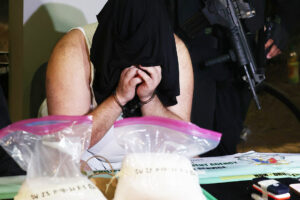Philippine Congress told not to shield Duterte from ICC probe

THE BIGGEST labor coalition in the Philippines on Tuesday denounced a Senate resolution seeking to protect former President Rodrigo R. Duterte from the International Criminal Court’s (ICC) probe of his deadly drug war.
“We believe that this move is a blatant disregard of justice for the thousands of victims of extrajudicial killings in the country and an insult to the ICC’s mandate to investigate and prosecute individuals who commit crimes against humanity,” Nagkaisa said in a statement.
“Justice is not the luxury of the rich, it is the right of every Filipino.”
The labor group said working with the ICC would ensure erring state officials are held accountable for abuses during the drug war.
On Monday, Senator Robinhood Ferdinand “Robin” C. Padilla filed a resolution seeking the “unequivocal defense” of Mr. Duterte from the ICC probe.
As this developed, Senator Jose “Jinggoy” Estrada filed a similar resolution expressing the upper chamber’s “strong opposition” to the ICC investigation.
Under Senate Resolution 492 filed on Monday, the lawmaker said the pre-trial chamber’s decision to resume the probe undermines the country’s judicial system.
“The Senate of the Philippines strongly opposes the decision of the ICC to resume its investigation of the crimes committed in Philippine territory, in questioning the fully capable judicial system of the Philippines as well as disrespecting its sovereignty,” he said.
Mr. Estrada was among the 17 lawmakers who voted for the concurrence of the Senate to the Rome Statute, the treaty that created ICC, during the 15th Congress.
“I would like to make it clear that I did not change my mind insofar as casting my vote to concur with the ratification of the Rome Statute some 12 years ago,” he said in a separate statement on Tuesday.
“My stance on this issue is also based on the Rome Statute’s principle of complementarity, which recognizes a state’s right to exercise jurisdiction over most serious crimes of international concern,” he added, noting that under this principle, the ICC will only act if the state is “unable or unwilling to investigate and prosecute the crime.”
The Philippines withdrew from the ICC in March 2018 under Mr. Duterte, who said there was “a concerted effort on the part of the United Nations special rapporteurs to paint me as a ruthless and heartless violator of human rights who allegedly caused thousands of extrajudicial killings.”
‘INTERFERENCE’“It is clear that we enforce the law and those concerned pursue individuals found guilty of violations,” Mr. Estrada said, noting that at least four criminal cases have been filed against erring cops.
“Any interference by the ICC in the jurisdiction of our government would be considered a violation of Philippine sovereignty,” he added.
Former President and Pampanga Rep. Gloria Macapagal Arroyo and more than a dozen congressmen made a similar call last week, saying the Philippines had a functioning justice system.
President Ferdinand R. Marcos, Jr. on Saturday called the ICC’s probe a threat to the country’s sovereignty, saying the ICC did not have jurisdiction over the Philippines.
“I have stated it often, even before I took office as president, that there are many questions about their jurisdiction and what can be — what we in the Philippines regard as an intrusion into our internal matters and a threat to our sovereignty,” he told reporters.
“We call on the Senate and the House to withdraw their resolutions and to respect the ICC’s mandate to investigate and prosecute individuals who commit crimes against humanity,” Nagkaisa said.
Last month, the ICC pre-trial chamber reopened its investigation into the killings and so-called crimes against humanity under Mr. Duterte’s anti-illegal drug campaign.
The Hague-based tribunal said it was not satisfied with Philippine efforts to probe the deaths.
In a decision on Feb. 17, the ICC appeals chamber granted the Philippine government’s request for more time to file its appeal to suspend the probe. It gave the country up to March 13.
ICC prosecutor Karim Ahmad A. Khan on Feb. 16 asked the international court to deny the Philippines’ request, saying it did not raise new arguments to justify halting the probe.
The international tribunal, which tries people charged with crimes against humanity, genocide, war crimes and aggression, suspended its probe of Mr. Duterte’s deadly war on drugs in 2021 upon the Philippine government’s request.
The Philippine government estimates that at least 6,117 suspected drug dealers had been killed in police operations. Human rights groups say as many as 30,000 suspects died.
More than 30 member-states of the United Nations Human Rights Council in November urged the Philippine government to do something about extralegal killings in connection with Mr. Duterte’s anti-illegal drug campaign.
The Philippines has accepted 200 recommendations from the UN Human Rights Council, including investigating extralegal killings and protecting journalists and activists. — John Victor D. Ordoñez and Alyssa Nicole O. Tan




